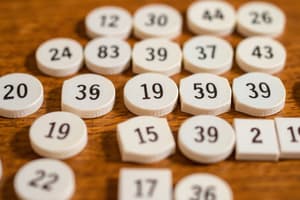Podcast
Questions and Answers
Which of the following describes how to compare two decimals?
Which of the following describes how to compare two decimals?
Decimals are not used in scientific measurements.
Decimals are not used in scientific measurements.
False (B)
What is meant by significant digits?
What is meant by significant digits?
Significant digits express the accuracy of measurements.
In commerce, decimals are critical for representing ______, weights, and measures.
In commerce, decimals are critical for representing ______, weights, and measures.
Signup and view all the answers
Match the following applications to their use of decimals:
Match the following applications to their use of decimals:
Signup and view all the answers
What is the place value of the digit 5 in the decimal 45.678?
What is the place value of the digit 5 in the decimal 45.678?
Signup and view all the answers
All decimals can be expressed as fractions.
All decimals can be expressed as fractions.
Signup and view all the answers
How would you convert the fraction 5/8 into a decimal?
How would you convert the fraction 5/8 into a decimal?
Signup and view all the answers
To add decimals, you must align the decimal points _____ before performing the operation.
To add decimals, you must align the decimal points _____ before performing the operation.
Signup and view all the answers
What is the result of 3.6 × 0.4?
What is the result of 3.6 × 0.4?
Signup and view all the answers
Match the following types of decimals with their characteristics:
Match the following types of decimals with their characteristics:
Signup and view all the answers
When rounding the number 4.576 to the nearest tenth, the result is 4.6.
When rounding the number 4.576 to the nearest tenth, the result is 4.6.
Signup and view all the answers
What is the first step in dividing decimals?
What is the first step in dividing decimals?
Signup and view all the answers
Flashcards
Comparing Decimals
Comparing Decimals
Align decimal points and compare digits from left to right.
Greater Decimal
Greater Decimal
The decimal with the larger digit in a given place value.
Real-World Applications of Decimals
Real-World Applications of Decimals
Decimals represent money, weights, and measures in everyday life.
Significant Digits
Significant Digits
Signup and view all the flashcards
Rules of Significant Digits
Rules of Significant Digits
Signup and view all the flashcards
Decimal Representation
Decimal Representation
Signup and view all the flashcards
Place Value
Place Value
Signup and view all the flashcards
Converting Fractions to Decimals
Converting Fractions to Decimals
Signup and view all the flashcards
Converting Decimals to Fractions
Converting Decimals to Fractions
Signup and view all the flashcards
Adding Decimals
Adding Decimals
Signup and view all the flashcards
Multiplying Decimals
Multiplying Decimals
Signup and view all the flashcards
Dividing Decimals
Dividing Decimals
Signup and view all the flashcards
Rounding Decimals
Rounding Decimals
Signup and view all the flashcards
Study Notes
Decimal Place Value
- Decimals represent fractions whose denominators are powers of 10.
- Each digit in a decimal has a place value.
- Place values to the left of the decimal point represent increasing powers of 10 (ones, tens, hundreds, etc.).
- Place values to the right of the decimal point represent decreasing powers of 10 (tenths, hundredths, thousandths, etc.).
- The position of a digit determines its value.
- Example: In the decimal 3.14, the 3 is in the ones place, the 1 is in the tenths place, and the 4 is in the hundredths place.
Converting Between Fractions and Decimals
- To convert a fraction to a decimal, divide the numerator by the denominator.
- To convert a decimal to a fraction, express the decimal as a fraction with a denominator that is a power of 10.
- For example, 0.75 is equal to 75/100, which simplifies to 3/4.
- Terminating decimals can be converted directly to fractions.
- Repeating decimals require a more complex method to convert to fractions.
Adding and Subtracting Decimals
- To add or subtract decimals, align the decimal points vertically.
- Add or subtract the digits in each place value column, carrying over or borrowing as needed.
- Place the decimal point in the sum or difference directly below the decimal points in the numbers being added or subtracted.
- Example: 2.5 + 1.25 = 3.75
Multiplying Decimals
- To multiply decimals, multiply the numbers as if they were whole numbers.
- Count the total number of digits to the right of the decimal points in the factors.
- Place the decimal point in the product so that the number of digits to the right of the decimal point is equal to the total count from the factors.
- Example: 2.5 x 1.2 = 3.0
Dividing Decimals
- To divide decimals, move the decimal point in the divisor to the right until it becomes a whole number.
- Move the decimal point in the dividend the same number of places to the right.
- Perform the division as if both numbers were whole numbers.
- Place the decimal point in the quotient directly above the decimal point in the dividend.
- Example: 2.5 ÷ 0.5 = 5
Rounding Decimals
- Rounding decimals involves approximating a decimal to a specific place value.
- Look at the digit immediately to the right of the place value to which you are rounding.
- If the digit is 5 or greater, round up.
- If the digit is less than 5, round down.
- Example: Round 3.14159 to the nearest hundredth. The digit in the thousandths place is 1, so round down. The answer is 3.14.
Comparing Decimals
- Compare decimals by aligning the decimal points.
- Compare the digits from left to right, starting with the greatest place value.
- The decimal with the greater digit in a given place value is the larger decimal.
- Example: 2.5 is greater than 2.1
Real-World Applications of Decimals
- Decimals are used extensively in everyday life.
- In commerce, decimals are critical for representing money, weights, and measures.
- In science and engineering, decimals are fundamental for precise measurements and calculations.
- In sports and other competitive fields, decimals are commonly used to represent scores, times, distances, or ratios.
Significant Digits
- The use of significant digits involves determining the accuracy of measurements.
- Significant digits are defined based on the measurement instrument.
- All digits in a number that express measured values of a quantity are termed significant.
- Rules determine which digits are significant and which are not.
Studying That Suits You
Use AI to generate personalized quizzes and flashcards to suit your learning preferences.
Description
Test your understanding of decimal place values and the conversion between fractions and decimals. This quiz covers the core concepts of how to identify place values and perform conversions effectively. Challenge yourself with practical examples and deepen your mathematical knowledge! also create podcast




